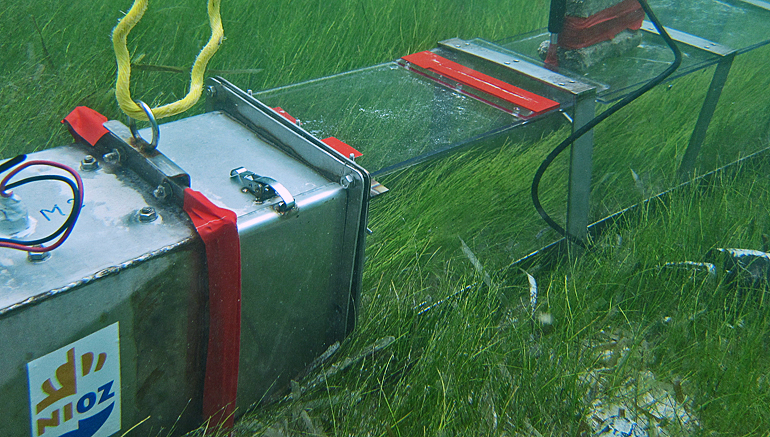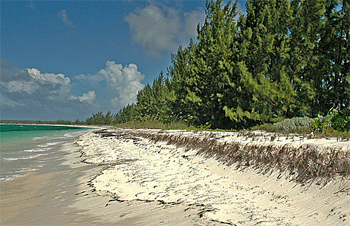Dutch-Mexican study: Seagrass beds as an asset for touristic beaches, not only a nuisance
 Seagrass beds are so effective in protecting tropical beaches from erosion, that they can reduce the need for regular, expensive beach nourishments. In a recent article in the journal BioScience, biologists and engineers from The Netherlands and Mexico describe experiments and field observations around the Caribbean Sea. The authors discovered the valuable asset of sea grass for the preservation of touristic coastlines, where sea grass is too often regarded as a nuisance.
Seagrass beds are so effective in protecting tropical beaches from erosion, that they can reduce the need for regular, expensive beach nourishments. In a recent article in the journal BioScience, biologists and engineers from The Netherlands and Mexico describe experiments and field observations around the Caribbean Sea. The authors discovered the valuable asset of sea grass for the preservation of touristic coastlines, where sea grass is too often regarded as a nuisance.
Prevention of coastal erosion
According to lead author Rebecca James erosion is a serious problem for Caribbean beaches: "Because of erosion, the economic value of Caribbean beaches literally drains into the sea."
"A foreshore with both healthy seagrass beds as well as calcifying algae, is a resilient and sustainable option in coastal defense", says James, a PhD-candidate at the University of Groningen and the Royal Dutch Institute for Sea Research (NIOZ), the Netherlands.
Expensive engineering efforts
Co-author Rodolfo Silva mentions the negative effects of current coastal development. "The natural flow of water and sand is disrupted, natural ecosystems are damaged, and many tropical beaches have already disappeared into the sea".
 Coastal erosion at Salvador Island, Bahamas (photo: James St.John/Flickr)
Coastal erosion at Salvador Island, Bahamas (photo: James St.John/Flickr)
Rodolfo Silva is professor of Coastal Engineering at the Universidad Nacional Autónoma of Mexico. He continues: "Until now, expensive coastal engineering efforts, such as repeated beach nourishments and concrete walls to protect the coast, have been made to combat erosion. Rising sea-level and increasing storms will only increase the loss of these important beaches."
Experimental field flume
To find out to what extent seagrass beds are able to hold sand and sediment on the beach foreshores, James and her team conducted a simple experiment, with a clear result. With a portable and adjustable field flume to regulate water motion in a Caribbean bay, they observed when particles on the sea bed started moving.
"We showed that seagrass beds were extremely effective at holding sediment in place", she says. "Especially in combination with calcifying algae that - create their own sand - a foreshore with healthy seagrass appeared a sustainable way of combating erosion."
More seagrass, less erosion
Along the coastline of the Mexican peninsula of Yucatan, the team put their theory to the test. By looking at beaches with and without protection of healthy seagrass beds, the team discovered that the amount of erosion was strongly linked to the amount of vegetation: more seagrass, meant less erosion.
At beaches where seagrass beds were destroyed, the researchers saw a sudden strong increase in erosion, resulting in an immediate need of expensive beach nourishments.
According to Mark van Koningsveld, professor at the Delft University of Technology and working for the international marine contractor Van Oord, the study opens opportunities for developing new tropical-beach protection schemes, in which ecology is integrated in engineering solutions.
Download the full scientific article (paid only) Maintaining Tropical Beaches with Seagrass and Algae: A Promising Alternative to Engineering Solutions, from website BioScience/Oxford Academic.
This news item was originally published on the websites of NIOZ and Utrecht of University.
(Top photo: NIOZ)
Read also on this website
● Deltares and Jamaican institute MGI collaborate on coastal resilience for the Caribbean, 16 October 2018
● Official opening Metronome tidal facility to simulate river flows at Utrecht University, the Netherlands
● Deltares leads major European study on damping of waves by vegetation, 4 February 2014
● Flemish-Dutch research team advocates benefits of constructed ecosystems for flood risk reduction, 12 December 2013
● Expertise: Enabling delta life
More information
NIOZ – Royal Dutch Institute for Sea Research
t Horntje (Texel), the Netherlands
+31 222 369 300
www.nioz.nl
University of Utrecht
Institute for Marine and Atmospheric research Utrecht (IMAU)
Utrecht, the Netherlands
+31 30 253 3275
www.uu.nl



